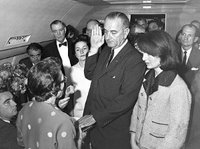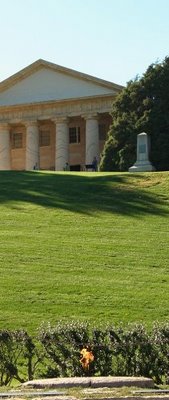
The other morning I was reading a story in the local newspaper about the upcoming anniversary of the assassination of John F. Kennedy on November 22, 1963. I found tears welling up in my eyes as I read of various people's reactions upon hearing the news on that Friday afternoon. Over the years, many have uttered, "I remember where I was when I heard that JFK was shot." Everything stopped.
 In When Harry Met Sally, Billy Crystal recounted how when he was dating a much younger female, when he asked her where she was when Kennedy was shot, she replied, astonished, "Ted Kennedy was shot?!?!?!" He then realized that he was dating way too young.
In When Harry Met Sally, Billy Crystal recounted how when he was dating a much younger female, when he asked her where she was when Kennedy was shot, she replied, astonished, "Ted Kennedy was shot?!?!?!" He then realized that he was dating way too young. Then I thought about the people I work with now. The oldest is 33 and the youngest is 21. None of them was even alive yet! I couldn't ask that familiar question. At dinner tonight, I was relaying this fact to two friends with me. Then I realized they were both in their late 30s. Had that much time passed?
Then I thought about the people I work with now. The oldest is 33 and the youngest is 21. None of them was even alive yet! I couldn't ask that familiar question. At dinner tonight, I was relaying this fact to two friends with me. Then I realized they were both in their late 30s. Had that much time passed? I was a sophomore in high school, in study hall in the auditorium. The PA system came on and the announcement was made, "President Kennedy was shot in Dallas." Everyone just looked up, stunned. A few minutes later the voice on the PA came on again, telling us that President Kennedy had died from the gunshot wounds. It seemed as if everyone in that study hall gave one big loud combined gasp. It was near the end of the school day. In the hallways there were kids crying. I remember going to my locker and passing my English classroom. I saw my English teacher with her head in her hands, sobbing.
I was a sophomore in high school, in study hall in the auditorium. The PA system came on and the announcement was made, "President Kennedy was shot in Dallas." Everyone just looked up, stunned. A few minutes later the voice on the PA came on again, telling us that President Kennedy had died from the gunshot wounds. It seemed as if everyone in that study hall gave one big loud combined gasp. It was near the end of the school day. In the hallways there were kids crying. I remember going to my locker and passing my English classroom. I saw my English teacher with her head in her hands, sobbing. For the next 4 days, we were glued to the TV set. JFK's body being brought back to Washington DC. Jackie, in her outfit and stockings, all blood stained. The look of shock and disbelief on her face. The procession of people filing past the coffin in the Capitol rotunda. Lee Harvey Oswald being shot and killed on live TV. Incredulous and unbelievable!
For the next 4 days, we were glued to the TV set. JFK's body being brought back to Washington DC. Jackie, in her outfit and stockings, all blood stained. The look of shock and disbelief on her face. The procession of people filing past the coffin in the Capitol rotunda. Lee Harvey Oswald being shot and killed on live TV. Incredulous and unbelievable! For many of us, it seemed like America was shattered. How could this happen here? This was no banana republic! To a young 15 year old, it seemed like the world had changed from one of innocence and naivete to a new world of unrest, cynicism, fear and anger. This was one of those "defining moments" of life. There was much turmoil to follow in the next few years. Viet Nam, campus unrest, more assassinations, hippies, Woodstock, and Nixon. We were hungry for joy again. That's one reason, I think, that the Beatles arrival in February 1964 was so welcome. In some way, they were like a life saver or maybe just a distraction, from the grief. We moved onward. Was the world a better place? I think a lot died on that day.
For many of us, it seemed like America was shattered. How could this happen here? This was no banana republic! To a young 15 year old, it seemed like the world had changed from one of innocence and naivete to a new world of unrest, cynicism, fear and anger. This was one of those "defining moments" of life. There was much turmoil to follow in the next few years. Viet Nam, campus unrest, more assassinations, hippies, Woodstock, and Nixon. We were hungry for joy again. That's one reason, I think, that the Beatles arrival in February 1964 was so welcome. In some way, they were like a life saver or maybe just a distraction, from the grief. We moved onward. Was the world a better place? I think a lot died on that day.
"There was a sound of laughter; in a moment, it was no more. And so she took a ring from her finger and placed it in his hands.
There was a wit in a man neither young nor old, but a wit full of an old man's wisdom and of a child's wisdom, and then, in a moment it was no more. And so she took a ring from her finger and placed it in his hands.
There was a man marked with the scars of his love of country, a body active with the surge of a life far, far from spent and, in a moment, it was no more. And so she too a ring from her finger and placed it in his hands.
There was a father with a little boy, a little girl and a joy of each in the other. In a moment it was no more, and so she took a ring from her finger and placed it in his hands.
There Was a husband who asked much and gave much, and out of the giving and the asking wove with a woman what could not be broken in life, and in a moment it was no more. And so she took a ring from her finger and placed it in his hands, and kissed him and closed the lid of a coffin.
A piece of each of us died at that moment. Yet, in death he gave of himself to us.
 He gave us of a good heart from which the laughter came. He gave us of a profound wit, from which a great leadership emerged. He gave us of a kindness and a strength fused into a human courage to seek peace without fear.
He gave us of a good heart from which the laughter came. He gave us of a profound wit, from which a great leadership emerged. He gave us of a kindness and a strength fused into a human courage to seek peace without fear.He gave us of his love that we, too, in turn, might give. He gave that we might give of ourselves, that we might give to one another until there would be no room, no room at all, for the bigotry, the hatred, prejudice and the arrogance which converged in that moment of horror to strike him down.
In leaving us--these gifts, John Fitzgerald Kennedy, President of the United States, leaves with us. Will we take them, Mr. President? Will we have, now, the sense and the responsibility and the courage to take them?"
---Eulogy in the rotunda by Senator Mansfield
1 comment:
I was only a month old when JFK was killed. Your post does bring up an interesting subject of what is the earliest 'big event' that we remember and how generations define themselves.
For that, I remember watching the lunar landing...the earliest tragedy for me was the Challenger explosion that I watched live on tv.
Your experience of the school intercom reminded me of my mother telling of hearing that the Japanese had surrended in WWII while in class. All of the kids screamed, cheered, and ran outside to celebrate!
Post a Comment